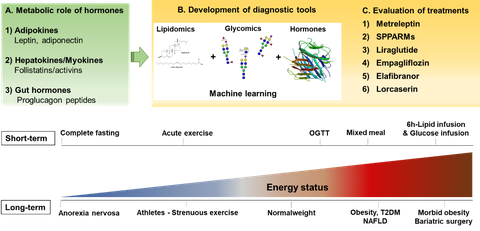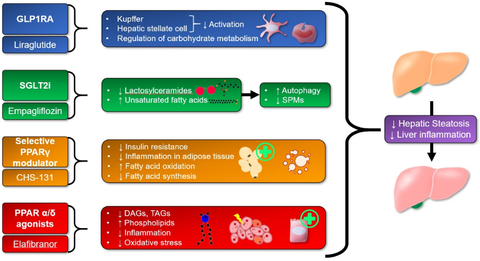Research Focus
Our research focuses on the identification and investigation of important regulators of energy balance in humans, by combining both animal and human studies in a clinical translational approach. First, we aim to reveal the pathophysiological role and predictive value of important hormones/biomolecules for the manifestation and progress of common metabolic diseases (i.e. type 2 diabetes mellitus [T2DM], obesity, non-alcoholic fatty liver disease [NAFLD]) in humans. Then, we use this information to generate non-invasive diagnostic-prognostic tools for metabolic diseases and to evaluate possible treatments in animal models.
Human studies
We perform observational and interventional human clinical studies with subjects in different energy and disease status, ranging from acute complete energy deprivation (i.e. complete fasting) or chronic energy deficit (anorexia nervosa, women developing hypothalamic amenorrhea due to strenuous exercise) up to conditions of modest or severe energy excess (mild obesity, T2DM, NAFLD, morbid obesity, severe dyslipidemia). With the use of these studies, we have previously described novel roles for specific biomolecules (e.g. leptin, follistatin, activin, proglucagon-deriving molecules) in body weight regulation, appetite control, glucose homeostasis and metabolic diseases. We have also used this information to develop accurate models for diagnosing Non-alcoholic Steatohepatitis (NASH) based on blood parameters.

We perform clinical studies in order to assess how the levels of certain hormones are regulated in different energy conditions and how strong they are associated with metabolic outcomes. We use this information either alone or combined with data from multiomic procedures in order to develop diagnostic or predictive models of metabolic diseases. Additionally, we evaluate either in interventional human studies or in animal studies, treatments that are related to these hormones and to metabolic diseases.
The clinical studies are performed in our clinical study center for metabolic diseases. For more information and possible participation in our studies, please visit us here.
Animal studies
We perform animal studies evaluating the hepatic effects and mechanisms of function of several medications in animal mouse models of NASH.

We have shown that several medications that are currently under clinical evaluation for the treatment of NASH in patients with type 2 diabetes can also improve hepatic status even in the absence of diabetes. These medications demonstrate important differences in the respective mechanisms of action, which supports the notion for their evaluation as combination therapies in the future.
Future Projects (examples)
- Validation of non-invasive diagnostic algorithms for NASH and development of new algorithms for liver fibrosis with the use of large cohorts / Development of predictive models for diabetes progress and diabetes complications.
- Identification of novel proteins involved in metabolic regulation with the use of omics in different energy and glucose states.
- Evaluation of the effect of novel proteins on NASH in mouse models.
